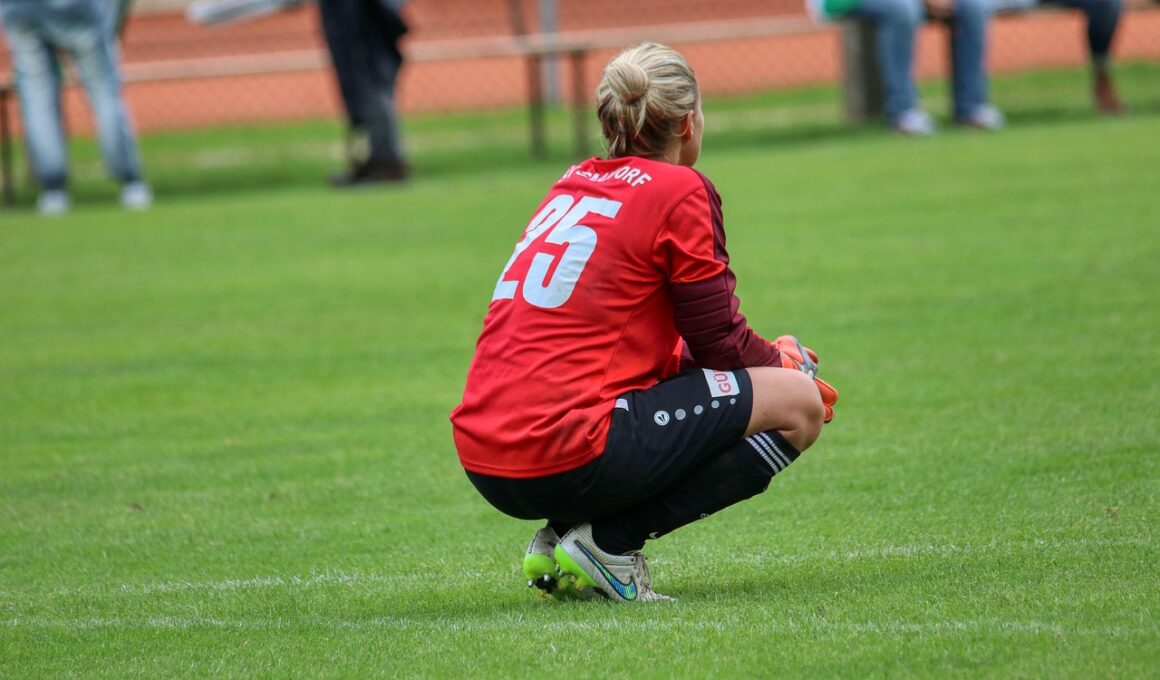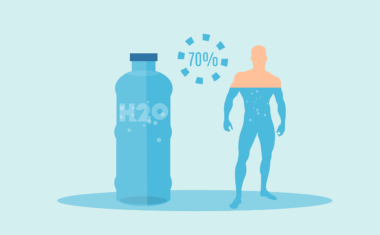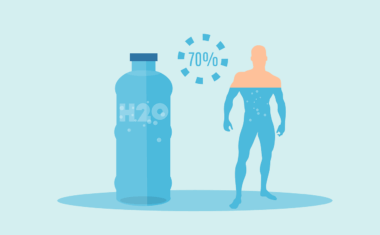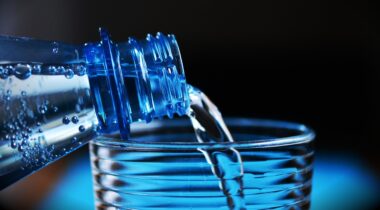Hydration Tips for Female Football Players
Proper hydration is crucial for female football players, as it significantly affects their overall performance and health. Water consumption should be consistent, with fluid intake resulting in optimal hydration levels. Players must begin their matches and training sessions well hydrated, ensuring that they drink enough fluids in the days leading to the game. A common guideline is to drink at least half of your body weight in ounces of water daily, particularly when engaged in intense training. Additionally, players should consume electrolyte-rich beverages after lengthy games or practices to replenish lost minerals. This could include sports drinks and coconut water. Monitoring the color of your urine can serve as a useful indicator; pale yellow suggests adequate hydration, while dark yellow indicates dehydration. It’s essential to remember that even mild dehydration can hinder physical performance, resulting in fatigue and reduced coordination. Therefore, female football athletes must prioritize their hydration strategy, ensuring they’re replenishing fluids before, during, and after exertion to maintain peak performance levels during the game and throughout the season. Staying hydrated also promotes recovery, enhances energy levels, and supports overall health and fitness in female athletes.
In addition to regular water intake, understanding the timing of hydration is equally important for female football players. Hydrating before a match is crucial; aim for 16-20 ounces of water about two hours ahead of the kickoff. During the game, players should sip on fluids regularly, approximately every 15-20 minutes, particularly if the match is longer. Staying hydrated during this time can lead to sustained energy levels and improved concentration on the pitch. After completing the game, it’s essential to rehydrate to restore lost fluids, promoting recovery. Consuming water alone may not be enough, especially when significant sweat loss occurs. To aid recovery, including recovery drinks containing carbs and proteins can be beneficial. Another smart strategy is to eat foods with high water content, such as watermelon and oranges, as part of your post-match meal. These snacks can help in fluid replenishment. Remember, being proactive about hydration can prevent headaches, muscle cramps, and fatigue, which are common consequences of dehydration. It’s vital for female football players to develop a comprehensive hydration plan to optimize their performance and well-being throughout the season.
Understanding Electrolytes
Electrolytes play a fundamental role in hydration and are an essential consideration for female football players. These minerals, including sodium, potassium, and magnesium, help regulate fluid balance, muscle contractions, and nerve function. During intense physical activities such as football, electrolytes are lost through sweat, leading to potential imbalances. To prevent this, it’s crucial to include electrolyte-rich foods in your diet, such as bananas, nuts, and dairy products. Alternatively, consuming sports drinks formulated with electrolytes can help replenish what’s lost through sweat. Additionally, players should tailor their intake based on the weather conditions and their sweat rate. Hot and humid conditions will increase fluid and electrolyte loss, necessitating a more aggressive hydration strategy. Understanding your own needs is vital; consider experimenting with various types of electrolyte solutions to find one that suits your taste and preferences. The right balance of electrolytes aids in maintaining endurance and focus during matches while also aiding in post-game recovery. Ignoring the importance of electrolytes can hinder performance and lead to unwanted fatigue, emphasizing the need for a well-designed hydration and nutrition plan that incorporates adequate electrolyte intake.
When it comes to hydration, many female football players may overlook the importance of monitoring their individual needs. Each athlete’s hydration requirements can vary based on factors such as body weight, sweating rate, and overall fitness levels. Therefore, keeping a hydration journal can be an insightful practice, allowing athletes to track their fluid intake alongside their physical performance and how they feel throughout training sessions and matches. By doing this, players can identify patterns, and optimal hydration levels tailored to their personal needs. Furthermore, utilizing tools like hydration calculators can provide insights based on weight and activity intensity. Athletes should aim for a balance that’s not only adequate but also consistent. Additionally, paying attention to environmental factors and ensuring adequate hydration regardless of training schedules can make a significant difference in maintaining optimum performance levels. It is essential for athletes to adjust hydration strategies and be aware of personal signals of dehydration, such as dryness of the mouth or fatigue. All of these elements contribute to a comprehensive approach towards enhancing performance and ensuring sustained energy throughout the demanding football season.
The Role of Nutrition in Hydration
Nutrition significantly influences hydration levels for female football players, playing a crucial role in optimal performance. Consuming a balanced diet rich in fruits, vegetables, whole grains, and lean proteins can contribute positively toward hydration. Foods such as cucumbers, oranges, and strawberries have high water content, promoting hydration without necessitating significant fluid intake. Additionally, incorporating healthy fats can improve nutrient absorption, aiding electrolyte retention and overall hydration levels. Moreover, ensuring adequate intake of vitamins and minerals, particularly during the peak training seasons, is essential for supporting hydration status. Female athletes can benefit from meals that focus on replenishing glycogen stores, paired with fluid consumption to maintain performance levels. Consider meal timing as part of your hydration strategy; eating light meals approximately 2 hours before training or matches can provide energy and improve hydration. Post-game or training refueling is equally important; a combination of carbohydrates and proteins, alongside hydration, aids recovery. Prioritizing nutrient-dense foods increases endurance while saving energy for rigorous training sessions, reinforcing the direct connection between nutrition and hydration for achieving top performance on the football field.
Moreover, other lifestyle choices can significantly impact hydration levels for female football players. It’s essential to minimize the intake of dehydrating substances such as caffeine and alcohol, which can affect hydration status and overall health. Even though caffeine may provide a temporary energy boost, excessive amounts can lead to dehydration, especially when participating in high-intensity physical activities. Additionally, alcohol consumption can impair recovery and hydration, so mindfulness around these substances is key. It’s important for athletes to create a supportive environment that encourages healthy choices; this may include honing in on hydration strategies with teammates and sharing tips on nutrition. Consistently using hydration reminders or incorporating hydration breaks during practice can also support collective well-being. Furthermore, ensuring that water is readily available during practices and games is crucial; establishing hydration stations can motivate players to consume fluids without interruption. This not only emphasizes hydration as a routine but also helps foster accountability among team members. The little habits and choices made daily can have a significant impact on hydration, performance, and overall health in the long run.
Creating a Personal Hydration Plan
Developing a personal hydration plan is an essential step for female football players looking to enhance their performance. A personalized approach should begin with hydration assessments to establish baseline needs, factoring in body weight, activity intensity, and individual perspiration rates. Start by documenting fluid intake patterns, noting how much is consumed pre-, during, and post-exercise over several sessions. This record will serve as a valuable reference to determine adjustments needed for optimal hydration. Incorporating various beverage options, including water, sports drinks, and natural juices, can add variety and maintain interest in hydration choices. Additionally, players can set hydration goals, such as drinking specific amounts before practice or setting reminders to drink while studying or resting. Furthermore, being mindful and conscious about hydration in daily life will positively influence athletic performance. Consistency is key; team players should collectively adhere to their hydration goals to improve the effectiveness of their hydration strategy. Ultimately, a systematic approach to hydration will not only optimize physical capabilities but also support long-term recovery and overall health, paving the way for continual athletic growth and success in football.
In conclusion, female football players must prioritize hydration as a crucial component of their athletic training. Understanding the individual needs, timing, and nutritional impacts surrounding hydration strategies can greatly enhance their performance on the field. By being proactive about hydration, focusing on electrolytes, monitoring their intake, and creating personalized hydration plans, athletes will experience improved energy, focus, and physical endurance. It’s important to encourage communication and collaboration within teams to promote shared hydration practices, fostering a supportive environment that prioritizes health and performance. Staying hydrated aids recovery and enhances overall well-being, enabling players to train and compete at their best throughout demanding seasons. So, as a female football player, make sure to appreciate and invest time in your hydration strategies while implementing these tips consistently. Your body will thank you with better performance and a healthier, energetic approach to your sports journey. Let these hydration tips empower you to play stronger, longer, and more effectively, allowing you to shine on the field. After all, hydration is not just about water—it’s about fueling your passion, dedication, and performance in football.





